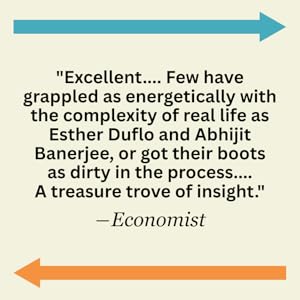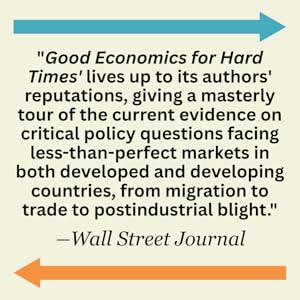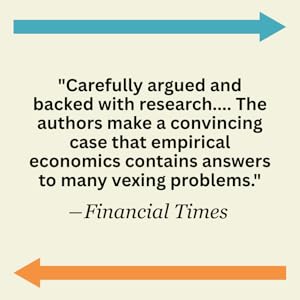Some deliveries may take a little longer than usual due to regional shipping conditions.
Customer Services
Copyright © 2025 Desertcart Holdings Limited


Full description not available



O**N
Development Economics with Humor and Modesty
So worth reading! Well written, well conceived, excellent bibliography.A lightning speed review of development economics, poverty and its alleviation (or attempts to do so) some of the problems in the attempts, tempered with the understanding that we understand little, the humility to think we don't have all the answers, the hope that by trying what we know, and instituting on a large scale some of the solutions that have worked with randomized control trials, we can make the world a much better place. One where people are treated with dignity, one where happiness is provided a place in the sun, as much as is formal economic growth. Highly recommended.
C**R
Lots of economics research in here, well down, about our trying times
Very well done. I've read a LOT of economics in the past few years. These Nobel Prize winners wrote a wonderful study of Poverty economics - and they followed it up with this one. This discipline might actually become a science some day. They get behavioral economics - they understand about controlled experiments - and they are worried about our economic future - as well they might be. So they take the controversial economic decisions of our trying times, and explain the best research they have found - and point out how WRONG most of our government programs are. And how and why they are so blindly supported by the general public.. This is NOT rocket science - but it is advanced psychology. NOW - if we could just get this down to a 1 minute commercial for the super bowl - we might actually make some headway on getting the world's economy back on track. Well - at a minimum - you can help. Read it, refer it to friends - remember the stories and do not let those folk get away with their simplistic arguments. Thanks - we are all in this together and I'm counting on you. Thanks, Red Green.
A**N
Readable economic overview of many of the topical problems we face today
Good Economics for For Hard Times looks at many of the issues consuming policy makers of today from an economist lens. It does not side with over simplified invisible hand ideas and instead focuses on many of the consequences of "market failures" that occur naturally and how they are occurring on a variety of scales in a variety of problems. The authors do not try to make all encompassing predictions but rather discuss several topics in some detail that are quite topical. For a general audience the book is both readable and informative though little/none of it is particularly revolutionary. The authors try to remind readers that there are no big picture solutions to the large issues we face, but with more disciplined economic reasoning we can at least face those problems with a better toolkit than our emotions.The author discusses many contentious issues including immigration, trade and growth. The authors start with two of the most charged issues of the day, namely the consequences of immigration to wages and the consequences of trade to employment opportunities. For the former, they give their arguments for the general economics consensus wisdom that immigration is a net positive and that immigrants contribute to society. They do cite those that disagree and their studies, namely the counterarguments of Borja, but then give further evidence to dispute him. From an economists lens they argue well but certainly the arguments that carry the day aren't based on reasoning. The authors also discuss trade policy and make the argument that if labor cannot frictionlessly move as a function of opportunity, classical capitalist arguments will fail in practice. The authors show that this is the case in the US and that the lack of labor mobility means that frictions of trade are real and require new policy thinking. The authors discuss big concepts like materialism and its use in framing economic goals via prioritizing GDP over other measures of wellness. The authors highlight that when policy is framed it is framed in terms of maximizing output and such a narrow goal is questionable. Distributional concerns about where wealth gets concentrated is not discussed enough and maximizing output without concern for distribution is something that should be reconsidered. The authors discuss Robert Gordon's concerns that growth is structurally lower than last century when several foundational technologies enabled decades long windows of productivity growth. They also discuss the statistical measurement of productivity growth coming from the internet and communications revolution and that part of it could be hard to measure but in all, it is less than last decade; though there are some reasons to believe that could change for the better in the coming decades. The consequences of the ICT revolution is also concerns about automation and its consequences. Here the authors give both pictures but highlight that there should be concerns and that concepts like living wage don't have the empirical support as leading to higher well-being that is touted by techno optimists who don't want to deal with the labor problem.Good Economics for Hard Times gives a readable economist overview of some of the problems faced today and the ways to think about them as well as the cost benefit we face. It is quite even handed and grounded in evidence rather than ideology. That being said, these topics are largely discussed more comprehensively in other books so discussions of Gordon's view on growth and discussions of the consequences of automation are largely overviews of the works of other people. The book is certainly well written and entirely comprehensible so for the interested reader it will have something to offer.
C**
Good Economics for hard times
good content!
R**T
An antidote to the simplistic coverage of economics in the news
Aristotle warned us against expecting more precision from a subject than it allows. As Aristotle wrote, “for it is the mark of an educated mind to seek only so much exactness in each type of inquiry as may be allowed by the nature of the subject-matter.”The idea that economics commands the same level of precision as physics has led to the perpetuation of several misconceptions and dogmas. That the authors fully understand this is a testament to the book. The authors are not dogmatic, nor are they apologists for any particular ideology; in each chapter, they summarize what the latest economic research tells us, and, more importantly, what it does not or cannot establish with any degree of certainty.Like any book with complex arguments and subtle distinctions, the criticism will come from all sides. While the authors undoubtedly lean left, there will be those who feel they don’t lean left far enough, while those on the right are destined to label the book as “socialist propaganda.” The truth, of course, is somewhere in between, as the authors summarize the latest economic research on each topic to arrive at intellectually honest interpretations of the data, making this book a model for how economics should be taught and studied.The authors don’t pretend to be all-knowing, but if you think that tax cuts for the wealthy stimulates growth, for example, you have more than 40 years of contradictory research and statistics to contend with. Likewise for immigration as the cause of depressed local wages or the reliance on the “free market” for efficient (or desirable) outcomes. The research just does not support these common beliefs or the simplistic theory that holds them up. The real world acts very differently than the economic models predict, so if you’re interested in actual results and statistics—rather than what economic theories tell us should happen—then this book is for you.So what is the way forward? No one knows for sure, but we do know that sacrificing the common good in the name of economic growth is almost always misguided. In addition to not knowing what stimulates growth in the first place, economic growth (as measured by GDP) means little to most of us if all the growth goes to the super-wealthy. Perhaps the job of the government is not to identify the factors of economic growth so much as to make the standard of living higher for the average person.
A**A
Excellent!
Realy great read.
E**A
Gutes Bich
Gutes Buch mit verständlichen Beispielen
G**A
Empaque
Me lo enviaron en una caja grande y suelto de esta forma me imagino que se estuvo deslizando a lo largo del viaje y llego ligeramente maltratado pero lo limpié y ya quedo bien.
L**N
Answers to some seemingly impossible questions.
In the past, economics is seemed primarily based on theory. Adam Smith had an idea that the invisible hand would improve economic output and thereby the lifestyles on which it would depend. Milton Freedman wanted a return to the economic freedom proposed by Smith as the best way to fix stagflation of the 1970s and early 80s. Marx believed that each should give according to their ability and receive according to their needs. And, of course, John Maynard Keynes believed in a little of each. However, these theories are so overarching that gathering data to support a particular proposed policy is not always possible.For example, the proposition that decreasing taxes to the rich improves economic output or GDP is completely debunked by this husband and wife team. They say there’s no data to support. It simply means a transfer of wealth from the poor and middle class to the rich and very rich. Tying aid to the poor to conditions such as food stamps is less efficient than just giving them money. As well, the poor as less likely to take advantage of aid if it’s tied to conditions. People may find jobs after they lose them to automation but they won’t find jobs of equal pay and the older employees are unlikely to ever find jobs. They state that it took 65 years for the wages of craftsman who lost their jobs during the industrial return to return to what they were.Economic dislocation and the need for providing people with the support when that happens is necessary should we want to live in a society where people are happy and provided for. As well, we need to tackle the problem of climate change immediately along with help for those whose jobs are displaced by that change. People need to be paid when they are training for those new positions as well as been given financial help should relocation be necessary.Abhijit and Esther argue for these and other solutions to our present problems and provide the data for support. They really do provide good economics for hard times. The do provide answers to some seemingly impossible questions.
B**Y
For a better, saner, more humane world
Shutting out immigrants, trade barriers, global warming and divisive politics for example are some hotly debated topics of the last decade. While everyone is interested in making this planet a better place to live in, narrow interests, misplaced political priorities and misguided populist rhetoric have sadly led to a highly polarized world.Sound economic theories have taken a backseat in such a scenario. This book debates key policy issues, slicing and dicing every topic from historical, social, political, and economic perspectives, with deep insights. It is an intellectual pursuit of making our planet a better place to live in.Unfortunately, Economics is not a perfect science either. It operates in a constant flux of diverse social, political, and cultural scenarios. Hence, when one policy succeeds in one nation, it fails miserably elsewhere. It is in this context that the authors’ randomized control trials won them the Nobel Prize in Economics 2019.Public perception of different professions differs widely. It is not surprising that politicians end up at the bottom of the pack, while nurses top the list in terms of whom we can trust. Surprisingly, economists too are at the bottom, slightly above politicians.Populist nationalism overrides sound economic principles as seen in recent times. In the USA, there is now a public perception that is averse to immigration. The land of immigrants has forgotten the greatness of the land created by the melting pot of global cultures. It is this unique character that has created a land of opportunities and a great nation. Immigrants are hardworking and entrepreneurs at heart. It is shown that migrant labour does not depress wages as widely feared. In fact, their work frees up higher paid professionals to work more, on more productive pursuits, thereby raising all boats. Immigrants top the list of all professionals and Silicon Valley billionaires. Yet, this fact was recently trumped by political campaigns creating fear about immigration, and resentment in society.Global trade is another example. While self-reliance is a great objective, it often narrows down into inward looking protectionist policies that shun imports and raise tariffs. This makes good politics in the short term, protects local businesses but eventually hurts consumers, blunts the nation’s global competitiveness and stunts economic growth. In fact, labour working in poorer nations are bigger beneficiaries of free trade, as amply demonstrated by the IT and ITES companies in India. It also brings in better technologies, creates a talent pool, attracts foreign investments, and leads to export led growth, as in the case of South Korea. The Stolper-Samuelson theorem is a brilliant academic work in this area.The chapters on concepts on economic growth, global warming and automation are equally interesting. Rich in content, unbiased, bold, and brilliant, this book is unputdownable.Ultimately, sound reason and good economics prevail, as we have seen recently. Let us unite, and not divide. ‘There are no blue states or red states, but only Unites States of America.’ Let us not build walls but spread love. Let us strive to make this most beautiful planet a better home for all.
Trustpilot
3 days ago
5 days ago